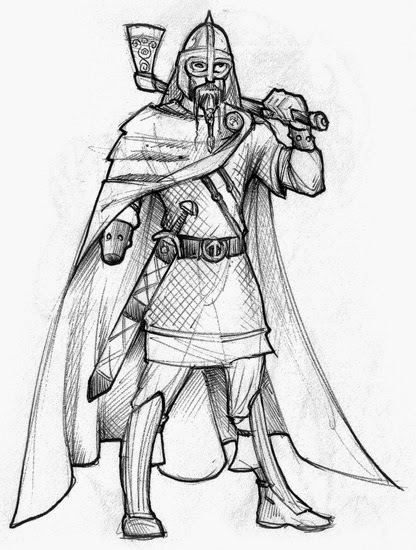Yes, yet another day of the week is named after a Norse god. Tyr (pronounced TEER) is the god of courage and justice. Tyr was originally known as Tiw (rhymes with ewe) and that's why the day is pronounced Tuesday.
That makes four days of the week named after Norse gods.
FYI: The modern Saturday is named after the Roman god, Saturn, but in Norse times it was washing day (apparently some things never change).
Back to Tyr - he is one of the oldest European gods and was originally the chief god, but was later overtaken in popularity and therefore in authority by Odin. The myth was modified so that Tyr later became Odin's son (so even though he is quite old, he belongs to the newer class of gods known as the Aesir).
picture from http://www.glogster.com/justincallicutt/norse-mythology-gods-godesses/g-6mgb6bd7r6icgsv36d50da0
As you can see from the picture above, Tyr is missing his right hand. That's because it was bitten off by Fenrir the Wolf.
It was predicted that Fenrir (son of the trickster god, Loki) would cause trouble for the gods so they endeavored to bind the giant wolf for their own safety. The wolf refused to allow the suspiciously innocent-looking cord to be put around him unless one of the deities put his or her hand in his mouth as a pledge of good faith.
Only Tyr was brave and honorable enough to comply with the beast’s request, and, when Fenrir found himself unable to break free of his fetters, he accordingly helped himself to the god’s hand. (Fenrir plays a part in Ragnarok, the Norse prediction for the end of the world, but that's for another post.)
The rune that represents Tyr is one of the oldest known runes. It has been found inscribed on swords, shields, and helmets dating back to 600 B.C. Tyr's rune is shaped like a spear and represents victory.
Next Thor's Day: Heimdall, the watchman of the gods
**facts sourced from Myths of the Norsemen by H.A.
Labels: Aesir , Norse myth , Thor's Day , Tyr , weekdays
0 Comments:
Subscribe to:
Post Comments
(
Atom
)



